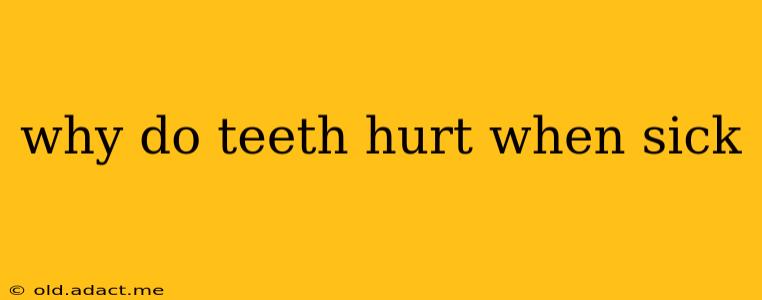Experiencing tooth pain when you're already sick is incredibly frustrating. That nagging ache adds another layer of discomfort to an already unpleasant situation. But why does this happen? The connection between illness and tooth pain isn't always straightforward, but several factors can contribute to this unwelcome symptom. Let's explore the possible reasons why your teeth might hurt when you're sick.
What Causes Tooth Pain When Sick?
The relationship between sickness and tooth pain is often indirect, meaning your illness isn't directly attacking your teeth. Instead, several factors associated with illness can trigger or exacerbate existing dental problems, leading to that familiar throbbing pain.
1. Weakened Immune System
When your body is fighting off an illness, your immune system is working overtime. This can leave you more vulnerable to infections, including those in your mouth. A weakened immune system might allow existing cavities or gum disease to become more inflamed and painful. Even minor irritations that wouldn't normally cause problems can become significantly more sensitive during illness.
2. Sinus Infection Pressure
Sinus infections often cause pressure buildup in the sinuses, which are located close to your upper teeth. This pressure can radiate into your teeth, causing pain that feels like it's originating in your upper jaw. The pain can be dull, aching, or even sharp, depending on the severity of the sinus infection. This is a common reason for tooth pain without any apparent dental problem.
3. Grinding or Clenching Teeth (Bruxism)
Stress and illness often go hand-in-hand. When you're sick, you might experience increased stress and anxiety, leading to involuntary teeth grinding or clenching (bruxism), especially during sleep. This can cause significant jaw pain and tooth sensitivity, especially in the morning.
4. Dehydration
Many illnesses cause dehydration, and this can indirectly affect your teeth. Saliva plays a crucial role in protecting your teeth by neutralizing acids and washing away food particles. Dehydration reduces saliva production, making your teeth more susceptible to acid erosion and bacterial growth, which can lead to increased sensitivity and pain.
5. Medication Side Effects
Some medications used to treat illnesses can have side effects that affect your mouth. Dry mouth, a common side effect of many drugs, contributes to the issues mentioned above, reducing saliva and increasing sensitivity. Certain antibiotics can also disrupt the oral microbiome, leading to imbalances that might cause discomfort.
Can a Tooth Infection Cause Sickness?
While often the sickness precedes the tooth pain, it's also possible for a severe tooth infection (abscess) to contribute to feelings of being unwell. An untreated abscess can lead to a spreading infection, causing fever, fatigue, and other flu-like symptoms. This is a serious condition requiring prompt dental attention.
When Should I See a Dentist?
If you experience tooth pain while sick and the pain:
- Is severe or persistent: Don't wait it out. Seek dental care immediately.
- Is accompanied by swelling, fever, or difficulty opening your mouth: This suggests a possible serious infection.
- Doesn't improve after your illness subsides: An underlying dental problem may require professional attention.
How to Manage Tooth Pain When Sick
While seeing a dentist is crucial for persistent or severe pain, you can try some home remedies for temporary relief:
- Rinse your mouth with warm salt water: This can help reduce inflammation and clean the area.
- Use over-the-counter pain relievers: Ibuprofen or acetaminophen can help manage pain and fever.
- Apply a cold compress to your jaw: This can reduce swelling and numb the area.
- Avoid sugary or acidic foods and drinks: These can aggravate sensitivity and worsen any existing dental problems.
Remember, this information is for general knowledge and does not replace professional dental advice. Always consult with a dentist or other qualified healthcare professional for diagnosis and treatment of any dental concerns.
